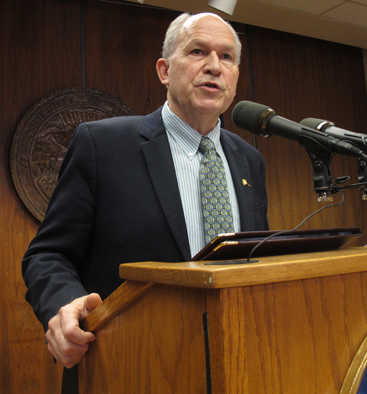JUNEAU — The Alaska Legislature is meeting in special session to consider buying out TransCanada Corp.’s position in a major liquefied natural gas project the state is pursuing with other partners. Here’s a look at the project and what’s at stake:
What is it?
The Alaska LNG Project is the latest attempt to develop natural gas on the state’s prodigious North Slope. As envisioned, it would be one of the largest projects of its kind, with an 800-mile pipeline and a gas treatment plant and transmission lines connecting to gas fields. It also would have a liquefaction plant and export terminal at Nikiski, about 170 miles from Anchorage.
Asia is the expected overseas market, though the project likely would include offtake points for gas for Alaskans.
Initial cost estimates are $45 billion to more than $65 billion.
While prior efforts to commercialize the state’s gas over decades have faltered, there are high hopes for this project. That’s partly because of the involvement of all three of the North Slope’s major producers and the importance to the state of another revenue stream as oil production declines.
Who is involved?
The project partners include BP, ConocoPhillips, Exxon Mobil Corp., TransCanada and the Alaska Gasline Development Corp., or AGDC.
AGDC is a state-sanctioned corporation, which would hold Alaska’s interest in the liquefaction facilities. Under the existing arrangement, TransCanada, a Calgary-based pipeline company, would hold Alaska’s interest in the pipeline and gas treatment plant.
Where does the project stand?
It’s in a preliminary stage, and a determination on whether to build it could be a few years away. But the state faces a year-end decision point on how or whether to continue its relationship with TransCanada.
TransCanada’s initial inclusion was billed as a way for Alaska to shoulder less of the upfront costs. But it also allowed the state and TransCanada a way out of a prior, failed effort to produce a gas line without a potentially messy fight.
What now?
Gov. Bill Walker has long had problems with the TransCanada arrangement, which predates his administration. The Republican-turned-independent argues a buyout would give the state a greater say in the project.
Regardless of whether the project succeeds, Alaska is obligated to pay TransCanada for costs it puts in on the state’s behalf, plus about 7 percent interest, a Walker administration consultant has said.
The administration is betting it can get financing cheaper elsewhere. The state could have to come up with about $7 billion to $8 billion more in upfront investment costs without TransCanada.
The administration says the state could get up to $400 million more a year when gas starts flowing without TransCanada in the picture.
What about lawmakers?
Legislative consultants say the financial case for keeping or shedding TransCanada is too close to be persuasive, given all the uncertainties at this early stage. They say the decision should focus on strategic considerations.
The state would owe TransCanada about $68 million if a buyout occurred.
TransCanada says it supports Walker’s recommendation to sever ties. It’s up to the Legislature to decide whether to approve money for the buyout and project-related costs that Walker is seeking, totaling about $158 million.

